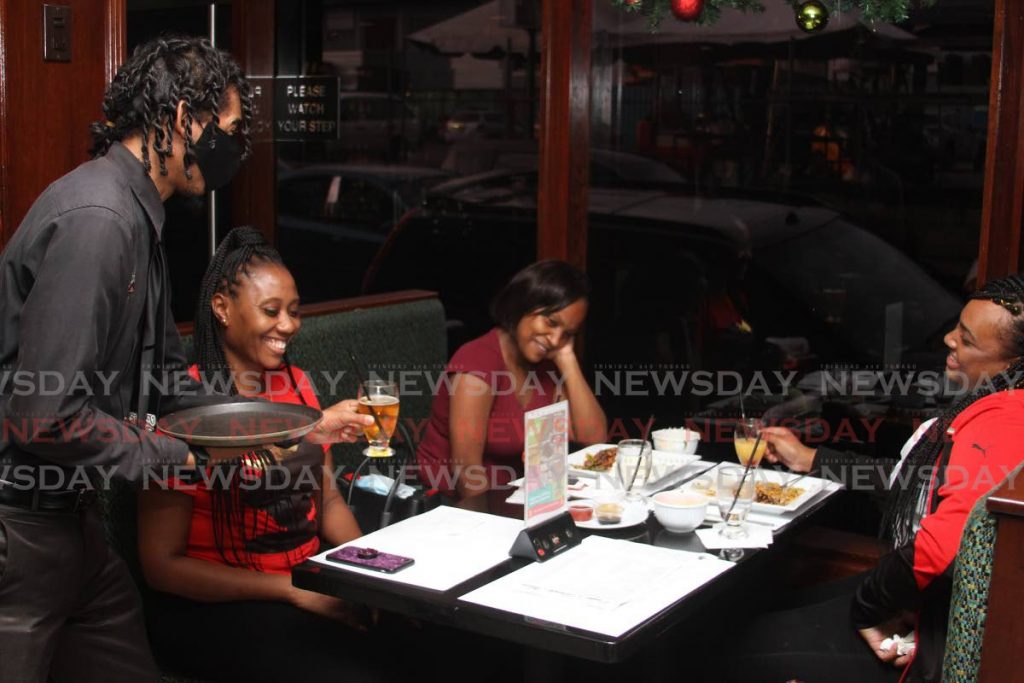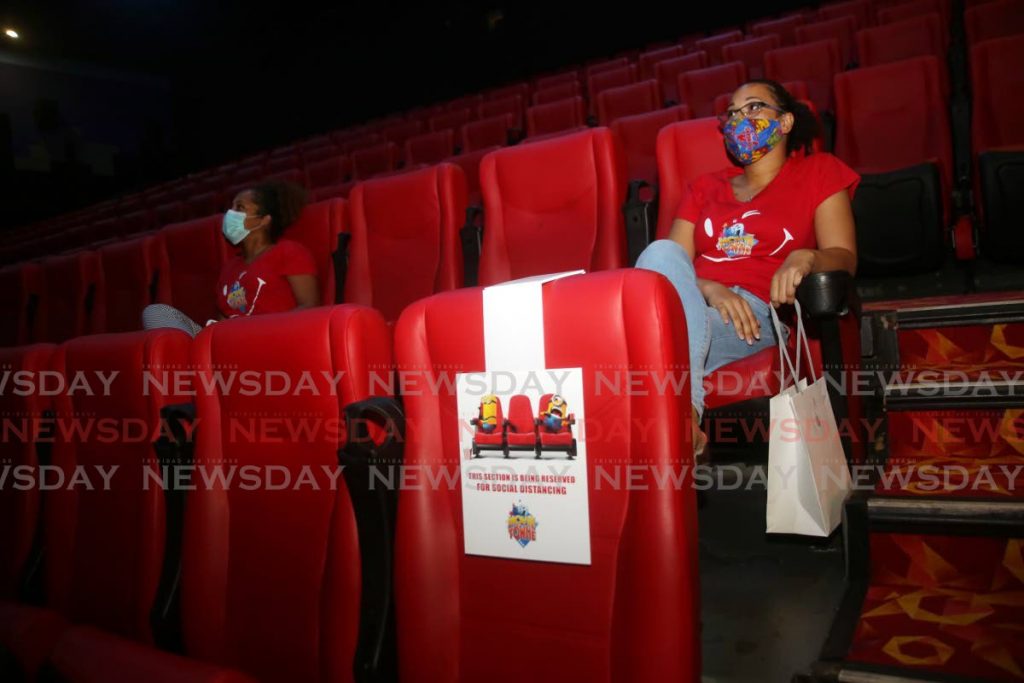Businesses want clear plan on covid19 'safe zones'

WHILE welcoming the Prime Minister's announcement of additional sectors of the economy being reopened in a month's time to vaccinated people, some stakeholders said on Saturday they want clear guidelines as to how this will be achieved.
One of those guidelines is how will vaccinated people be identified from those who are unvaccinated in the business "safe zones" which Dr Rowley referred to at a news conference at the Prime Minister's official residence in Blenheim, Tobago on Friday.
Rowley said if in four weeks, the projections continue with low covid9-positive numbers and consistent vaccinations, the aim will be to reopen bars and allow restaurants, gyms, cinemas, and private members 'clubs to open. He said certain aspects of business can become "safe zones" where vaccinated people can participate.
TT Chamber of Industry and Commerce CEO Gabriel Faria said the board is currently having discussions based on the PM's announcement.
Faria said the concept of business safe zones is something the chamber supports in principle, but added it would be premature to make an official statement until more information is made available.
"I can say that we support any mechanism which will continue to ensure the safety of unvaccinated persons in our society, while allowing businesses and schools to reopen safely and provide in-person services to the vaccinated."
Faria said other countries have implemented policies that permit the continued safety of the unvaccinated while allowing the vaccinated to access services which would be too risky for the unvaccinated.
MovieTowne chairman Derek Chin said based on the new order regarding only vaccinated people being allowed access into certain businesses, guidelines to comply will have to be put into place.
"We can at first put in a check system to verify that entry will be only given to vaccinated persons," he said.
Chin said people would have to show their vaccination cards "until maybe a plastic personalised bonafide card is issued." He said this may be the direction being contemplated worldwide in order to provide protection against the spread of covid19.
"It may not be the best system, but it appears that being vaccinated does offer a degree of protection against getting very sick versus the non-vaccinated person. It’s the only defence we have right now, people should view this as the best way mankind has available until something better comes up."
Saying that science and facts are showing that vaccination offers some protection against covid19, Chin said, "People need to stop creating all these doubts until it is too late."
He added that the presentation of a valid vaccination card to gain entry to some businesses would be the first step to getting those businesses reopened. Chin said this is similar to entry by mask only.
"That has become the norm and people have adjusted and adapted. At least those inside the premises will know they are as safe as possible."

He observed that people do not have problems conforming to safety and security checks when they are at the airport and before they are allowed to board a plane.
"We have adjusted to those inconveniences because the world has changed. Same here. This may very well become the new norm.
"In order to go to a fete or enter an event now requires security checks because the threat was a terrorist action or bomb, and we accept that. Now the threat is a health one, so new precautions like vaccination cards or PCR tests are a new requirement. Unfortunately that’s what’s required now as we experience these new challenges and threats."
CinemaOne Ltd CEO Ingrid Jahra said the company was encouraged about the possible reopening of cinemas in October. On the creation of safe zones of public spaces referred to by Rowley, Jahra said this suggests that "there should be a digital application developed that would allow any customer who is vaccinated to show a digital vaccination card that could be shown on a handheld device, like a cellphone."
In such a scenario, Jahra said once a person has presented a valid card, an identifier like a band would be given to show they had been screened. "I would think other checkpoints already installed, like temperature and sanitiser stands, would remain as well."
She said there needed to be a partnership between business and government on the creation of these zones. Using cinemas as an example, Jahra said, "It will impact queuing at customer contact points, so movie schedules will need to be adjusted and customers will need to plan for some added time before they can enjoy a movie."
Jahra said there have not been any discussions between Government and sectors that operate public spaces on the matters Rowley mentioned. She also said public health regulations, state of emergency regulations and other legislation may be needed to support any operational procedures "to ensure that vaccinated persons would be able to enjoy a movie or dine in at a restaurant." Jahra said another consideration is if there would be exemptions for young customers who want to enter certain businesses.
Greater San Fernando Chamber of Commerce president Kiran Singh said safe zones would be "a difficult proposition for retailers to adopt an approach of unvaccinated not being able to access goods and services as we seek to recover economic losses." But he welcomed Rowley's announcement of other sectors of the economy reopening next month. Singh hoped the Health Ministry should put policies and infrastructure in place to accommodate that reopening.
He also hoped Government will engage in tripartite discussions with the business community and labour unions to do what is necessary to ensure the safety of citizens and to ensure that whatever rules are made will be enforced. Singh said in other countries, there have been positive and negative results to the reopening of different sectors as the pandemic continues.
Greater Confederation of Regional Business Chambers Jai Leladarsingh said this is a complex issue. He said Government should construct a wider and detailed policy about how the private sector can effectively manage "the entry of vaccinated versus the unvaccinated into the respective businesses.
"This is a role that the Government cannot abdicate and leave it in the hands of the private sector."
He added that in the absence of such a policy "businesses face a number of risks, including litigative risks."
Trent Restaurant Group chairman Peter George was uncertain how businesses would be able to differentiate between vaccinated and unvaccinated customers.
"I understand the police will be doing checks and the onus will be on owners to enforce. It is going to be quite the challenge in an already very challenged environment."
He was unaware of any talks between Government and stakeholders about reopening the sectors Rowley referred to on Friday.
"We have to look at our situation from our own lines… Not simply copy what four or five parts of the world are doing.
"What we have here is a quasi-vaccination mandate. As if staff are not vaccinated they cannot work and if customers are not vaccinated they cannot come to these places."
The bigger question, he continued, is unvaccinated people can go to banks or supermarkets but not be allowed into restaurants, casinos and cinemas. "The entire thing is still very incongruent but at this stage of the game whatever is required to make a small step forward into protecting the livelihoods of hundreds of thousands of people in this country, so be it."
George said if 40-45 per cent of TT is vaccinated by the end of September, "then an industry that has been completely devastated gets the opportunity to reopen with its market being shrunk 50-60 per cent and with protocols in place."
He did not believe people being required to present identification and vaccination cards at the door of a business, and police being authorised to enter and check their credentials, made for a pleasant evening out.
While restaurants were recently allowed to do take-out, delivery and curbside pick-up services, George said the group's restaurants would remain closed for now, as it was not feasible for them to work if in-house dining was not being allowed. The Trent Group owns the Trotters, Buzo, Amara, Blue Star Diner and Tommy’s restaurants.


Comments
"Businesses want clear plan on covid19 ‘safe zones’"